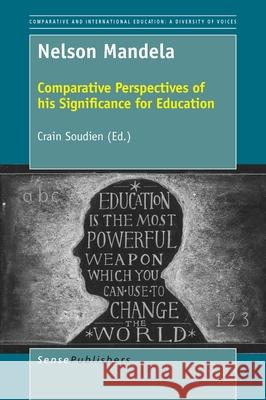Nelson Mandela » książka
Nelson Mandela
ISBN-13: 9789463009065 / Angielski / Miękka / 2017 / 188 str.
Nelson Mandela
ISBN-13: 9789463009065 / Angielski / Miękka / 2017 / 188 str.
(netto: 178,07 VAT: 5%)
Najniższa cena z 30 dni: 180,57
ok. 22 dni roboczych.
Darmowa dostawa!
The death of Nelson Mandela, the great South African fighter for freedom, in December 2013 prompted several colleagues within the World Council of Comparative Education Societies community to come together to think about the significance of his life and his for work education. This book is the result of that coming together. The contributing authors reflect on what his life, the commitments he made and principally the values he took into the struggle for freedom in South Africa mean for education. The point of departure for the book is that of honouring the man. It begins with the argument that the values for which he stood, namely, the unconditional dignity of all human beings, respect for difference and principally his lifelong commitment to justice, have a special significance for how we as inhabitants of an increasingly connected and interdependent world conduct our personal lives, our relationships with one another and with the material and living space which surrounds us. It is an ecological approach. As the world moves into a twenty-first century where, paradoxically, we know so much and yet appear to understand so little, and so find ourselves struggling to create social lives in which all of us can feel respected, can offer respect to others and live lives free of fear and anxiety, the values for which he stood have specific relevance for how we do the important job of teaching and what we put into it. Mandela poses deeply provocative questions about the kinds of lives we seek for ourselves and for everybody else around us.
The death of Nelson Mandela, the great South African fighter for freedom, in December 2013 prompted several colleagues within the World Council of Comparative Education Societies community to come together to think about the significance of his life and his for work education. This book is the result of that coming together. The contributing authors reflect on what his life, the commitments he made and principally the values he took into the struggle for freedom in South Africa mean for education. The point of departure for the book is that of honouring the man. It begins with the argument that the values for which he stood, namely, the unconditional dignity of all human beings, respect for difference and principally his lifelong commitment to justice, have a special significance for how we as inhabitants of an increasingly connected and interdependent world conduct our personal lives, our relationships with one another and with the material and living space which surrounds us. It is an ecological approach. As the world moves into a twenty-first century where, paradoxically, we know so much and yet appear to understand so little, and so find ourselves struggling to create social lives in which all of us can feel respected, can offer respect to others and live lives free of fear and anxiety, the values for which he stood have specific relevance for how we do the important job of teaching and what we put into it. Mandela poses deeply provocative questions about the kinds of lives we seek for ourselves and for everybody else around us.











